How Long Does Fresh Juice Last in Mason Jar
Fresh juice stored in a mason jar typically lasts 3-5 days when properly refrigerated at 33-35°F. You'll get the best nutritional value within the first 24 hours after juicing, as vitamin content naturally decreases over time. To maximize freshness, fill your mason jar completely to minimize air exposure, use an airtight seal, and store it on middle or back refrigerator shelves rather than the door. Watch for signs of spoilage like off-putting odors, unusual cloudiness, or separation. While mason jars offer better protection than plastic containers due to their airtight seal and chemical-free composition, proper storage techniques can considerably extend your juice's shelf life.
This post may contain affiliate links. If you make a purchase through these links, I may earn a commission at no additional cost to you. Additionally, portions of this post may be generated using artificial intelligence (AI) technology. While we strive for accuracy, please be aware that AI-generated content may not always be perfect and should be fact-checked when necessary.
The Spatula Scoops
- Fresh juice stored in mason jars typically lasts 3-5 days when properly refrigerated below 40°F (4°C).
- Fill mason jars completely to minimize air space, reducing oxidation and extending shelf life.
- For optimal nutrient preservation, consume fresh juice within 24 hours of juicing.
- Store mason jars on middle or back refrigerator shelves at 33-35°F, avoiding door storage.
- Check for spoilage through unusual odors, excessive layering, visible mold, or sour taste before consuming.
Understanding Fresh Juice Storage
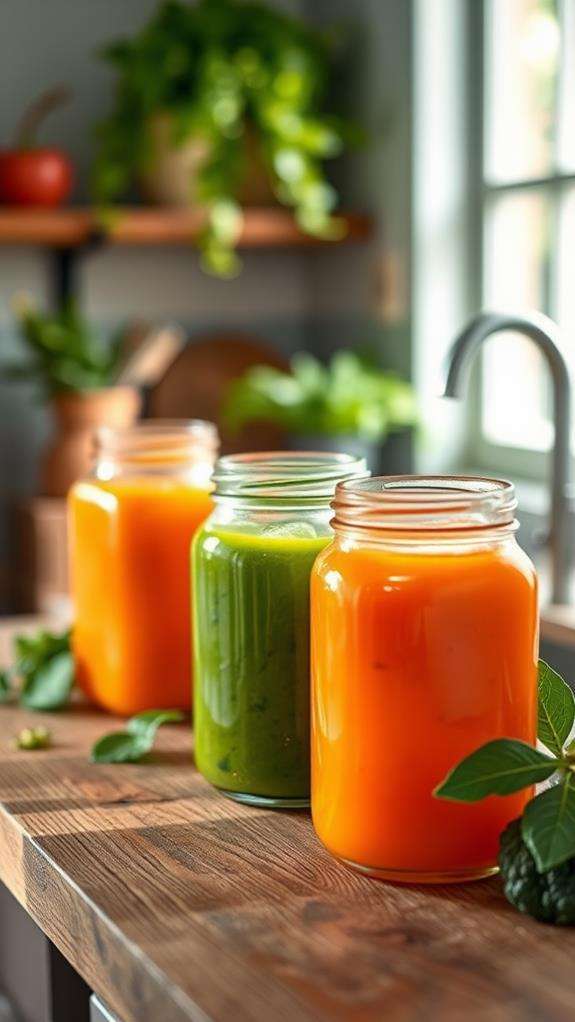
The proper storage of fresh juice plays an essential role in maintaining its quality and safety. When you're understanding fresh juice storage, it's vital to recognize that exposure to air, light, and temperature fluctuations can greatly impact your juice's longevity. Mason jars provide an excellent storage solution, especially dark glass varieties that protect against light degradation.
You'll want to fill your mason jars completely to the top, leaving minimal air space, as this reduces oxidation and slows bacteria growth. When storing fresh juice, you should immediately refrigerate it at temperatures below 40°F (4°C). While your juice can last 3-5 days in the fridge, you'll notice the quality begins to decline after the first 24 hours. To guarantee you're consuming safe juice, watch for warning signs of spoilage. If you notice any off-putting odors, separation that doesn't remix with a gentle shake, or changes in color toward brown tones, it's time to discard the juice. Remember, while proper storage techniques can extend shelf life, consuming your fresh juice within the first day assures you'll get the maximum nutritional benefits and the best possible taste.
Mason Jar Storage Benefits
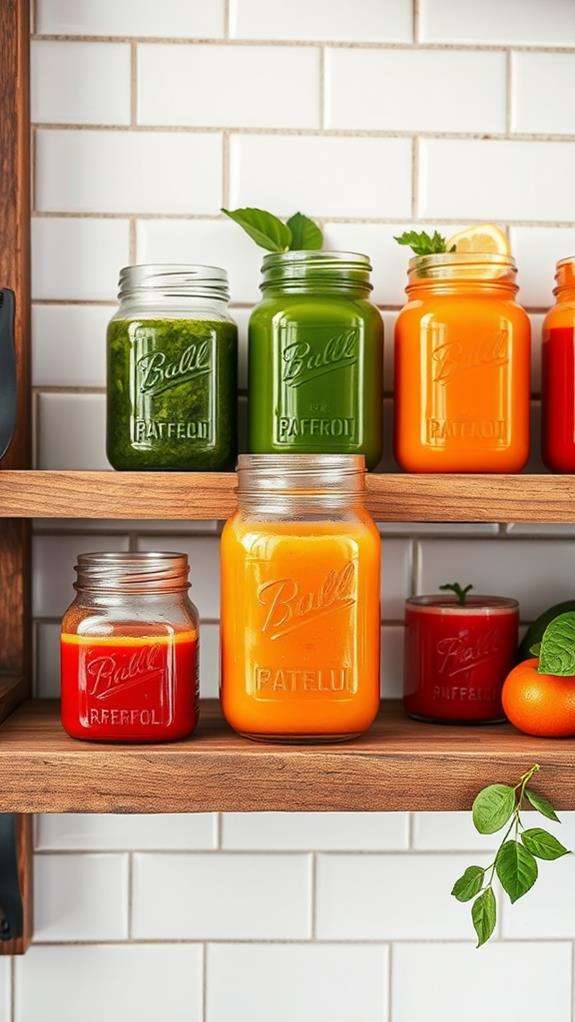
When it comes to preserving fresh juice, mason jars stand out as an exceptional storage solution due to their airtight sealing capabilities and versatile design features. You'll find that these sturdy containers can keep your freshly pressed juice in ideal condition for 3-5 days when properly refrigerated.
To maximize your juice's shelf life, make sure you're filling the jars completely to the top, leaving minimal air space that could lead to oxidation. If you're serious about preservation, opt for dark glass mason jars, which provide an extra layer of protection against light exposure that can degrade your juice's nutrients. You'll want to label each jar with the preparation date, so you can track freshness and consume your juice at its peak quality.
Unlike plastic containers that might compromise your juice's freshness, mason jars provide a reliable, non-reactive storage environment. As soon as you've finished juicing, transfer your beverage directly into these jars and place them in the refrigerator. This immediate storage helps maintain the juice's vibrant flavors, nutrients, and overall quality throughout its storage period.
Signs Your Juice Expired
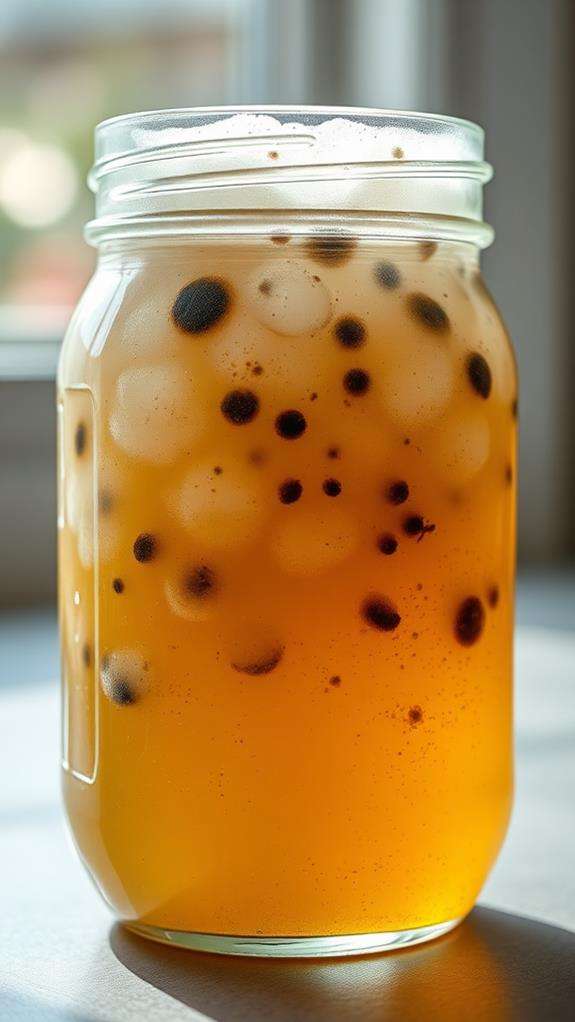
Juice spoilage signs can be detected through multiple sensory cues that'll help you determine if your beverage has expired. Your senses are your best tools for identifying when fresh juice has gone bad, and it's essential to pay attention to these warning signals to avoid consuming spoiled products.
First, trust your nose – if you detect any off-putting or fermented smells when opening your mason jar, it's time to discard the juice. You'll also want to examine the juice's appearance carefully. While some separation is natural, excessive layering or unusual cloudiness suggests your juice isn't safe to drink anymore. Keep an eye out for any mold growth on the surface, as this is a definitive sign that your juice has expired. When it comes to taste, don't consume juice that has developed a sour flavor, as this indicates fermentation has occurred. Remember that even though fresh juice can last 3-5 days in your fridge, the quality diminishes considerably after 24 hours. When in doubt, it's better to be safe and dispose of juice showing any questionable characteristics rather than risk consuming spoiled juice.
Optimal Storage Temperature
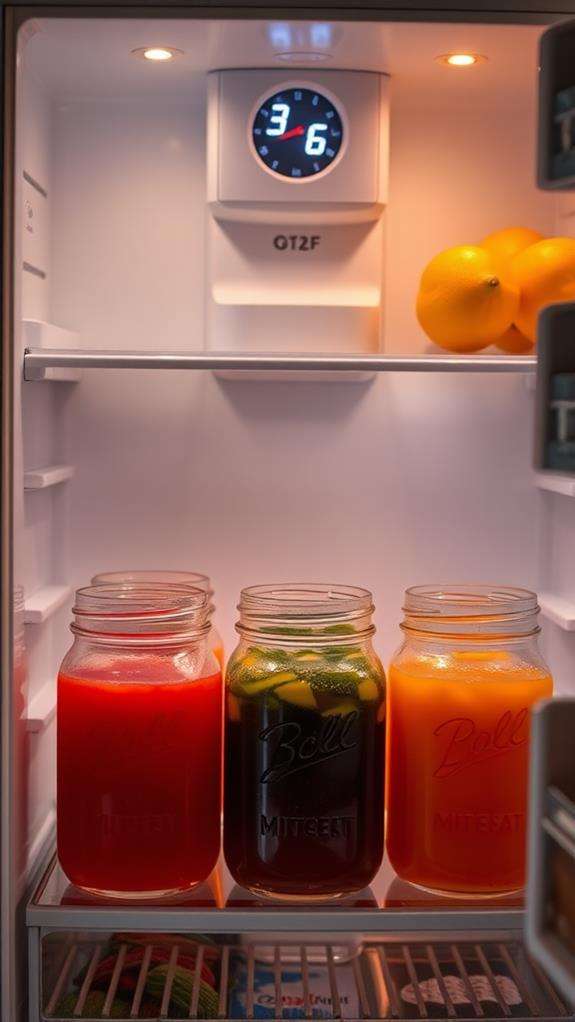
Maintaining proper storage temperature is essential for preserving your fresh juice's quality and extending its shelf life. You'll want to keep your mason jars at a precise temperature range of 33°F to 35°F in your refrigerator to prevent your juice from going bad prematurely. This specific temperature range helps minimize oxidation and slows down the growth of microorganisms that can spoil your juice.
While it might seem convenient, don't store your mason jars on the refrigerator door shelves. These areas experience frequent temperature changes every time you open and close the door, which can accelerate juice degradation. Instead, place your jars on the middle or back shelves where the temperature remains more stable. If you're using clear mason jars, consider switching to dark glass versions, as they offer better protection against light exposure that can diminish nutrient content. Even with perfect temperature control, remember that fresh juice typically maintains its best quality for only 3-5 days. By maintaining consistent refrigeration temperatures and following these storage guidelines, you'll help guarantee your juice stays fresh and nutritious for as long as possible.
Glass Versus Plastic Containers
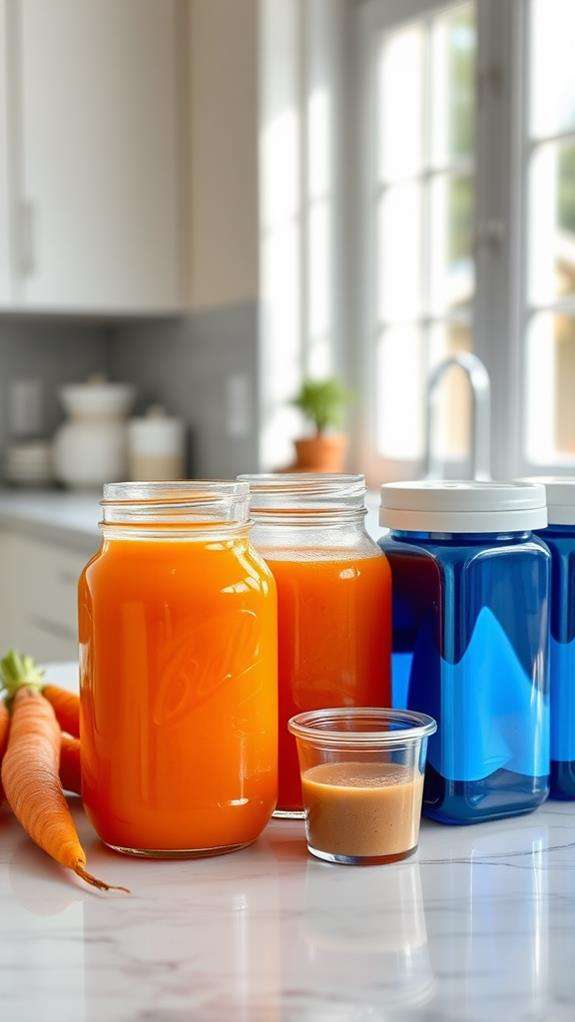
When it comes to storing your fresh juice, you'll want to reach for glass containers, particularly mason jars with their reliable airtight seals, which help maintain your juice's nutrients and enzymes while preventing oxidation. Unlike plastic containers that can leach chemicals and compromise juice quality, glass vessels, especially dark-tinted ones, offer superior protection against light degradation and bacterial growth. You'll find that mason jars are not only easier to clean and sterilize but also provide a more reliable storage solution that can extend your juice's shelf life by several days when compared to plastic alternatives.
Mason Jar Storage Benefits
If you're looking to maximize the shelf life of your fresh juice, mason jars offer notable advantages over plastic containers. The airtight seal of a mason jar creates an ideal environment for your juice, preventing oxidation that can quickly degrade both flavor and nutritional content. You'll find that these glass containers maintain juice freshness for up to 3-5 days when properly stored in your refrigerator.
One of the key mason jar storage benefits is their chemical-free composition. Unlike plastic containers that may leach unwanted substances into your juice, mason jars provide a pure, stable storage environment. When you opt for dark glass variations, you're also protecting light-sensitive nutrients from degradation. To get the most out of your mason jar storage, you'll want to fill the containers right to the top, leaving minimal air space. This simple step noticeably reduces oxidation and helps maintain the juice's fresh taste. The glass construction also handles temperature fluctuations better than plastic, ensuring your juice stays at a consistent temperature in the refrigerator, which is essential for maintaining its quality and extending its shelf life.
Plastic Container Drawbacks
Plastic containers present significant drawbacks that can compromise your fresh juice's quality and safety. When you store juice in plastic containers, harmful chemicals can leach into your beverage, especially if the juice contains acidic ingredients or is exposed to heat. You'll notice this problem becomes more pronounced over time, potentially affecting both the taste and safety of your juice.
Unlike their glass counterparts, plastic containers often fail to provide an airtight seal, which leads to increased oxidation of your juice. You're likely to experience faster degradation of nutrients and freshness when using plastic storage options. The non-porous nature of glass makes it inherently superior, as you won't have to worry about lingering odors or stubborn stains that often plague plastic containers. Additionally, when you're dealing with temperature changes, plastic containers can warp or become brittle, creating potential contamination risks through tiny cracks and crevices. If you're serious about maintaining your juice's nutritional value, you'll want to take into account that plastic containers offer no protection against harmful light exposure, unlike dark glass containers which naturally shield your juice from degradation-causing UV rays.
Preserving Juice Nutrients
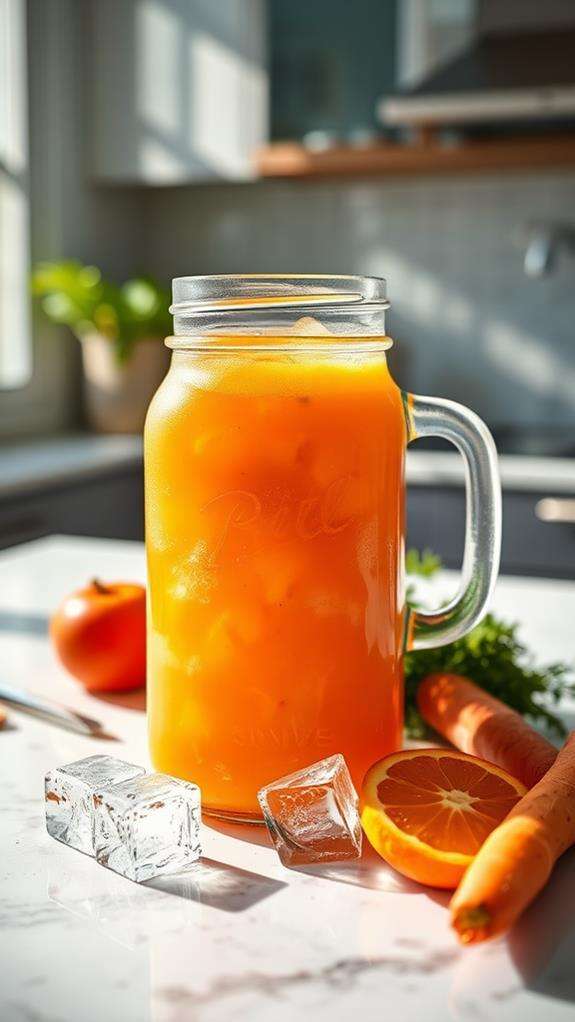
You'll get the most nutrients from your fresh juice by paying attention to three key storage factors: temperature, container material, and air exposure. To maximize vitamin retention, keep your juice in an airtight, dark glass container filled to the top, and store it at a consistent temperature between 35-38°F in your refrigerator. While your juice can last several days when properly stored, you'll want to consume it within 24 hours of juicing to get the highest concentration of nutrients, especially if you've included vitamin C-rich ingredients in your blend.
Maximizing Vitamin Content Storage
Preservation of essential nutrients in fresh juice requires careful attention to storage methods. When you're focused on maximizing vitamin content, timing and container choice become vital factors in maintaining nutritional value. You'll want to consume your fresh juice within 24 hours, as vitamin C and other nutrients begin degrading through oxidation after this period.
To protect your juice's nutritional content, you'll need to implement several strategic storage techniques. Start by selecting dark-colored mason jars, which shield the juice from light exposure that can diminish its nutrient density. Fill your containers completely to the rim before sealing to minimize the amount of air trapped inside. If you're planning to store juice for more than a few hours, consider using a vacuum pump system, which can help retain up to 90% of the nutritional benefits by removing excess air.
Adding citrus fruits to your juice recipes isn't just for flavor – their natural acids act as preservatives that help stabilize vitamin content during storage. Whether you're using lemons, limes, or oranges, these additions can greatly extend the life of your juice's nutritional profile.
Temperature Impact on Nutrients
Temperature plays an essential role in maintaining your fresh juice's nutrient content, with ideal storage requiring a precise range of 33°F to 35°F. When you make your juice and store it properly within this temperature range, you'll notably reduce the degradation of essential vitamins, particularly vitamin C, which is highly sensitive to temperature fluctuations.
To protect your juice's nutrients effectively, avoid storing mason jars in your refrigerator door, where temperatures frequently fluctuate with each opening and closing. Instead, place them on a middle shelf where the temperature remains more stable. Using dark glass mason jars provides an additional layer of protection by shielding your juice from light exposure, which can break down valuable antioxidants.
For optimal nutrient preservation, consider implementing vacuum sealing techniques alongside proper temperature control. This combination creates a protective environment that minimizes oxygen exposure, helping to maintain your juice's nutritional integrity. Remember that sudden temperature changes can trigger rapid enzyme breakdown, so it's essential to maintain consistent cooling from the moment you store your freshly made juice until you're ready to consume it.
Best Storage Materials
While temperature control safeguards your juice's nutrients, the storage container you choose plays an equally significant role in maintaining freshness. Mason jars stand out as your best option when you're looking to keep your fresh juice lasting as long as possible, primarily due to their airtight sealing capability and versatile design.
To enhance your juice's shelf life in mason jars, follow these essential steps:
- Fill the jar completely to the rim, leaving minimal air space to prevent oxidation.
- Select dark-colored mason jars to protect against light exposure.
- Clean and sanitize your jars thoroughly before each use.
You'll want to pay special attention to the jar's seal, as it's vital for maintaining freshness and preventing premature nutrient degradation. When you're storing citrus, green, or any other fresh juice, verify the lid is properly tightened to create an airtight environment. While mason jars provide excellent storage conditions, remember that even with ideal storage, your juice will retain its peak nutritional value for about 24 hours. After this window, you'll notice gradual changes in taste and nutritional content, even in the best storage conditions.
Proper Mason Jar Filling
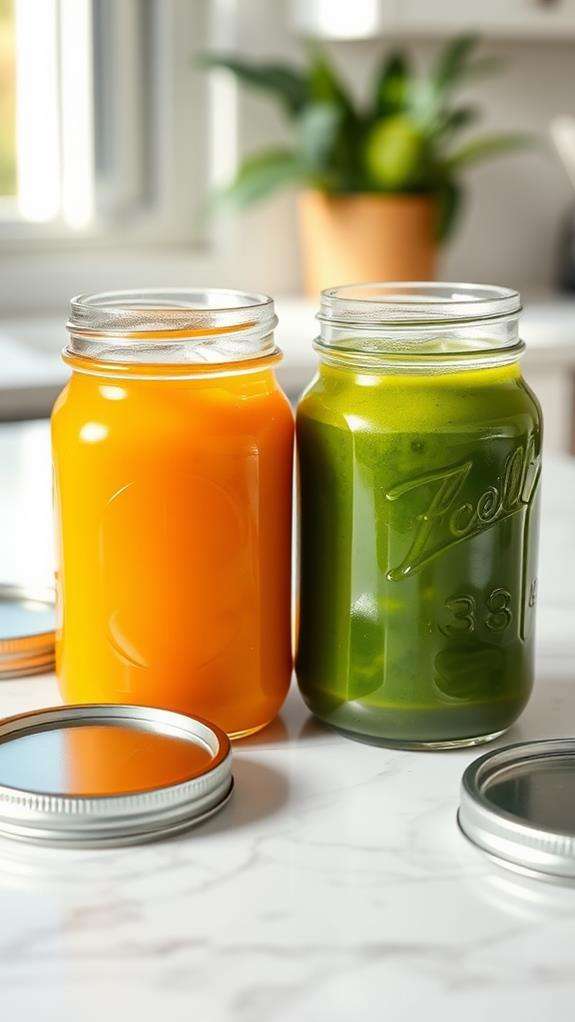
For ideal juice storage in mason jars, filling them correctly makes a significant difference in preserving freshness. Let's go through the essential steps to guarantee your juice stays fresh for as long as possible. When filling your mason jars, you'll want to leave minimal headspace at the top to prevent oxidation, which can degrade both flavor and nutrients.
| Feature | Purpose | Benefit |
|---|---|---|
| Fill Level | Minimize air exposure | Reduces oxidation |
| Lid Tightness | Create airtight seal | Prevents spoilage |
| Glass Color | UV protection | Preserves nutrients |
Before filling your jars, confirm they're thoroughly sanitized to prevent any bacterial growth that could compromise your juice. If you're looking to maximize preservation, consider investing in a vacuum pump system – it's a game-changer for extending shelf life. When securing the lid, twist it firmly but don't overtighten, as this could damage the seal. Dark-colored mason jars are your best choice if you're planning to store juice for more than a day, as they'll protect against light degradation. Remember to check the seal's integrity before each use, and always store your filled jars in the refrigerator.
Cleaning Storage Containers
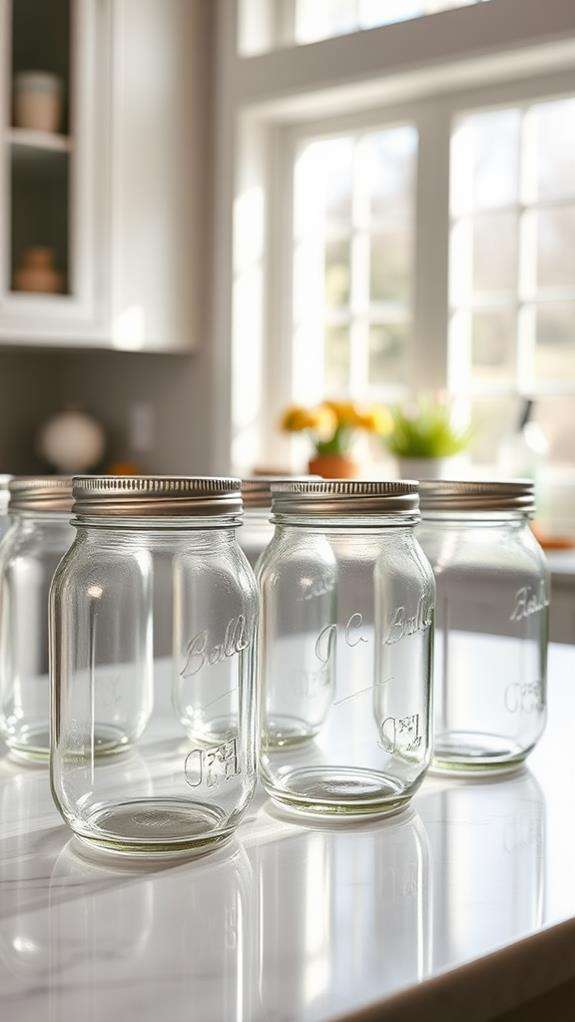
Cleanliness stands as the foundation of safe juice storage. When you're preparing your mason jars for juice storage, you'll need to follow a thorough cleaning process to guarantee your fresh juice stays safe and delicious. Start by washing your storage containers with hot, soapy water, making sure to clean every surface, nook, and cranny. If you have leak-proof containers like the Ello Duraglass meal prep glass containers, their durable design enhances your storage experience.
Here's your essential cleaning process for storage containers:
- Wash thoroughly with hot, soapy water, paying special attention to the jar's rim and threading where bacteria commonly hide.
- Rinse completely with hot water until you've removed all soap residue that could affect your juice's taste.
- Consider an optional sanitizing step using a solution of one tablespoon of unscented bleach per gallon of water for maximum safety.
After cleaning your storage containers, let them air dry completely in a clean environment. You don't want to trap any moisture that could lead to bacterial growth. Once they're bone dry, store your clean containers in a cool, dry place until you're ready to fill them with fresh juice. This careful attention to cleaning storage containers will help maximize your juice's shelf life and maintain its quality.
Frequently Asked Questions
How Long Is Juice Good for After Juicing?
Your fresh juice is best consumed within 24 hours of juicing for ideal nutrition and flavor. While you can store it for 3-5 days in the refrigerator, you'll notice quality diminishing after the first day due to oxidation. You'll want to keep it in an airtight mason jar and watch for signs of spoilage like odd smells or color changes. Citrus juices typically last longer, and you can extend shelf life using vacuum sealing methods.
How Do You Keep Fresh Juice From Spoiling?
Let's say you've just made a delicious batch of carrot-apple juice – here's how to keep it fresh. You'll want to store your juice in airtight mason jars filled to the brim to minimize oxidation. Keep it in your fridge at 33-35°F, and if possible, use dark glass containers to protect against light damage. When you're storing multiple servings, it's better to use several small jars rather than one large container to reduce repeated air exposure.
How Long Does Watermelon Juice Last in a Mason Jar?
Your freshly made watermelon juice will last 3-5 days when stored properly in a mason jar in your refrigerator. For the best results, you'll want to fill the jar completely and make sure it's sealed tightly to minimize oxidation. While it can last several days, you should try to drink it within 24 hours for best flavor and nutrients. Adding a splash of lemon juice can help extend its freshness, and you'll want to discard it if you notice any brown coloring or odd smells.
How Long Does Lemon Juice Last in a Mason Jar?
Your fresh lemon juice will last 3-5 days when stored properly in a mason jar in your refrigerator. To get the longest shelf life, you'll want to fill your airtight jar to the top, minimizing air exposure. Thanks to its natural acidity, lemon juice stays fresh longer than most fruit juices. You'll know it's gone bad if you notice browning, strange odors, or cloudiness. Don't forget to label your jar with the juicing date.





